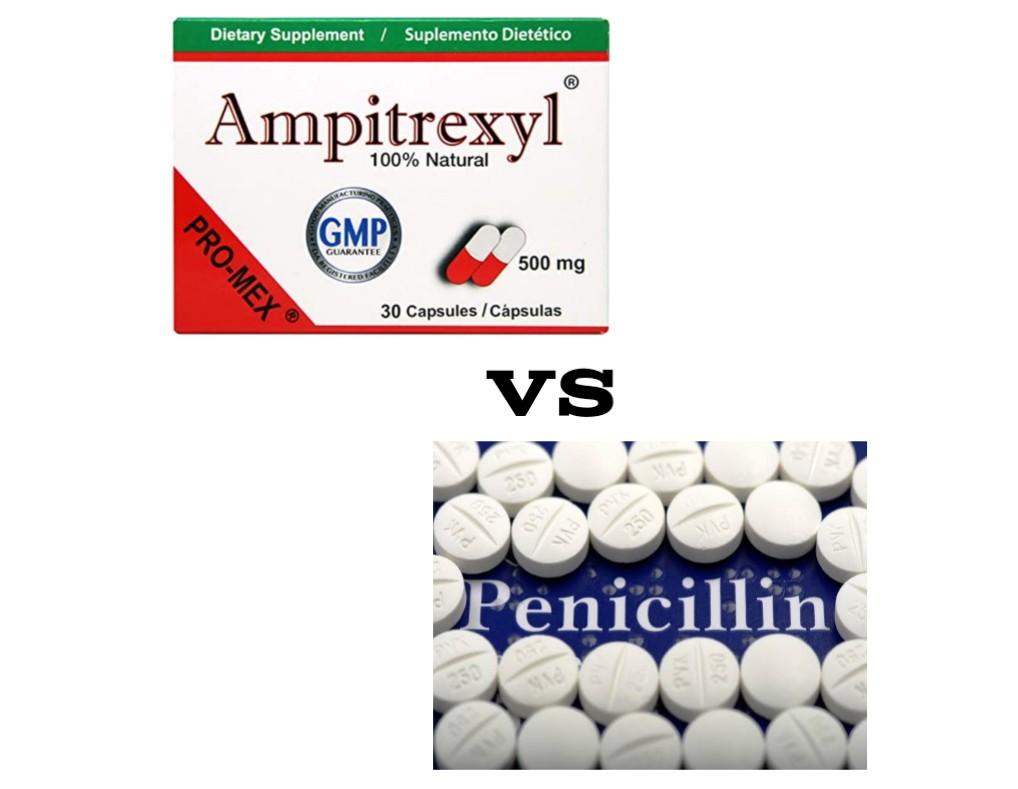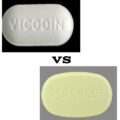The ProMex Ampitrexyl Plus natural supplement antibiotic is a combination of natural herbs and plant-based remedies that helps to fight off infections. The dietary supplement is a safe and powerful natural medicine that works to boost immunity to encourage a healthier immune system and combat infection. This over-the-counter capsule offers an alternative to other over-the-counter drugs. It comes in a 30-count package with 15 servings per container for at least two weeks of feeling better. This product is intended for adults only.
On the other hand, Penicillin is a group of antibiotics, derived originally from common moulds known as Penicillium moulds; which includes penicillin G (intravenous use), penicillin V (use by mouth), procaine penicillin, and benzathine penicillin (intramuscular use).
Active Ingredients
Ampitrexyl Plus natural supplement antibiotic is a combination of natural herbs and plant-based remedies high in Antioxidants (Vitamin-C) + Sambucus, Zinc, Echinacea & Bee Propolis to help support the immune system. In general, Ampitrexyl contains the following ingredients: Andrographis Paniculata, Sambucus Nigra Fruit Extract, Vitamin C, Zinc Gluconate, and Corydalis Extract. The term “penicillin” was used originally for benzylpenicillin, and penicillin G. Currently, “Penicillin” is used as a generic term for antibiotics that contain the beta lactam unit in the chemical structure. β-Lactams represent one of the most important groups of antibiotics prescribed for antibacterial treatment today. They stop bacterial growth by inhibiting PBPs that are indispensable for the cross-linking process during cell wall biosynthesis.
Uses
Penicillin is a widely used antibiotic prescribed to treat staphylococci and streptococci bacterial infections. Penicillin belongs to the beta-lactam family of antibiotics, the members of which use a similar mechanism of action to inhibit bacterial cell growth that eventually kills the bacteria. Penicillin is used to treat certain infections caused by bacteria such as pneumonia and other respiratory tract infections, scarlet fever, and ear, skin, gum, mouth, and throat infections. Ampitrexyl helps fight off infections, encourages a healthier immune system, and promotes overall health.
Dosage
The maximum recommended daily dosage of Ampitrexyl is 3 servings per day for adults, preferably with a meal. Penicillins (except bacampicillin tablets, amoxicillin, penicillin V, pivampicillin, and pivmecillinam) are best taken with a full glass (8 ounces) of water on an empty stomach (either 1 hour before or 2 hours after meals) unless otherwise directed by your doctor.
For patients taking amoxicillin, penicillin V, pivampicillin, and pivmecillinam:
- Amoxicillin, penicillin V, pivampicillin, and pivmecillinam may be taken on a full or empty stomach.
- The liquid form of amoxicillin may also be taken by itself or mixed with formulas, milk, fruit juice, water, ginger ale, or other cold drinks. If mixed with other liquids, take them immediately after mixing. Be sure to drink all the liquid to get the full dose of medicine.
For patients taking bacampicillin:
- The liquid form of the medicine is best taken with a full glass (8 ounces) of water on an empty stomach (either 1 hour before or 2 hours after meals) unless otherwise directed by your doctor.
- The tablet form of the medicine may be taken on a full or empty stomach.
For patients taking penicillin G by mouth:
- Do not drink acidic fruit juices (for example, orange or grapefruit juice) or other acidic beverages within 1 hour of taking penicillin G since this may keep the medicine from working properly.
For patients taking the oral liquid form of penicillins:
- This medicine is to be taken by mouth even if it comes in a dropper bottle. If this medicine does not come in a dropper bottle, use a specially marked measuring spoon or other devices to measure each dose accurately. The average household teaspoon may not hold the right amount of liquid.
- Do not use it after the expiration date on the label. The medicine may not work properly after that date. If you have any questions about this, check with your pharmacist.
For patients taking the chewable tablet form of amoxicillin:
- Tablets should be chewed or crushed before they are swallowed.
Side Effects
Anecdotal evidence suggests that taking Ampitrexyl on an empty stomach could cause stomach cramps. The most common reactions to oral penicillin are nausea, vomiting, epigastric distress, diarrhea, and black hairy tongue. The hypersensitivity reactions reported are skin eruptions (maculopapular to exfoliative dermatitis), urticaria and other serum-sickness-like reactions, laryngeal edema, and anaphylaxis.
Ampitrexyl vs Penicillin: Which is Better?
The diagnosis of an infection, whether in ourselves or a loved one, can be a stressful event, especially in light of the ongoing spread of multiple drug resistance. Although Ampitrexyl reviews suggest that it is very effective, especially in the treatment of gum infections, it is important that you discuss it with your doctor before swapping a penicillin prescription for Ampitrexyl.
Knowing when you may need an antibiotic depends on the kind of infection you have.
The first step is to consult your physician to determine whether your infection is bacterial or viral. Always consult your doctor if you suspect that you have an infection of any kind.
Colds and Flu
As stated above, viruses cause these diseases. Antibiotic therapy will not cure them. Talk to your health care provider about the many over-the-counter medications available to treat the symptoms of colds and flu.
Remember to inform your doctor or pharmacist about all the medications you are currently taking so as to avoid harmful drug interactions.
Sore Throats
Viruses typically cause sore throats, but bacteria, such as strep throat, can cause some. Your physician may do a culture and a sensitivity test before prescribing antibiotic therapy.
Sinus Infections
Both viruses and bacteria can cause these infections. If you have a runny nose with yellow or green mucus, you may need an antibiotic, so consult your physician.
Ear Infections
These infections do not always require antibiotic treatment, because both viruses and bacteria can cause them.
Coughs and Bronchitis
Viruses almost always cause these conditions. However, if you have had a medical problem with your lungs before, bacteria may be involved, and an antibiotic may be prescribed. Consult your doctor about any prolonged coughs, especially coughs with phlegm.
Proper Use of Antibiotics
When an antibiotic is prescribed for you, you should take the following steps:
- Inform your physician of any allergies you have—such as a penicillin allergy—prior to receiving any antibiotics. Women should inform their doctor if they are pregnant. Women also should be aware that some antibiotics could make their birth control pills less effective or make them more susceptible to developing a yeast infection. Your health care provider will discuss recommendations to address these issues.
- Be sure to take the complete amount of antibiotics prescribed according to the physician’s instructions. Failure to comply may result in a reoccurrence of the bacterial infection. Know how and when to take your antibiotic.
- Ask your pharmacist about potential side effects, and contact your physician immediately if serious reactions occur.
- If you miss a dose, do not double the next dose. Simply resume with the next scheduled dose as directed.
- Because some foods and alcohol may interact badly with antibiotics, discuss with your pharmacist whether you should take antibiotics on an empty or full stomach.
- Make sure that antibiotics are stored properly. Although most may be stored at room temperature in a dry place, some require refrigeration.
Antibiotics can be very powerful in treating bacterial infections when they are used properly. To maintain their effectiveness, they should be used only when necessary.
The best way to combat infections is to educate yourself and those around you on the proper way to treat infections without causing harm or making things worse. READ: Can I Take Augmentin For Urinary Tract Infection (UTI)





